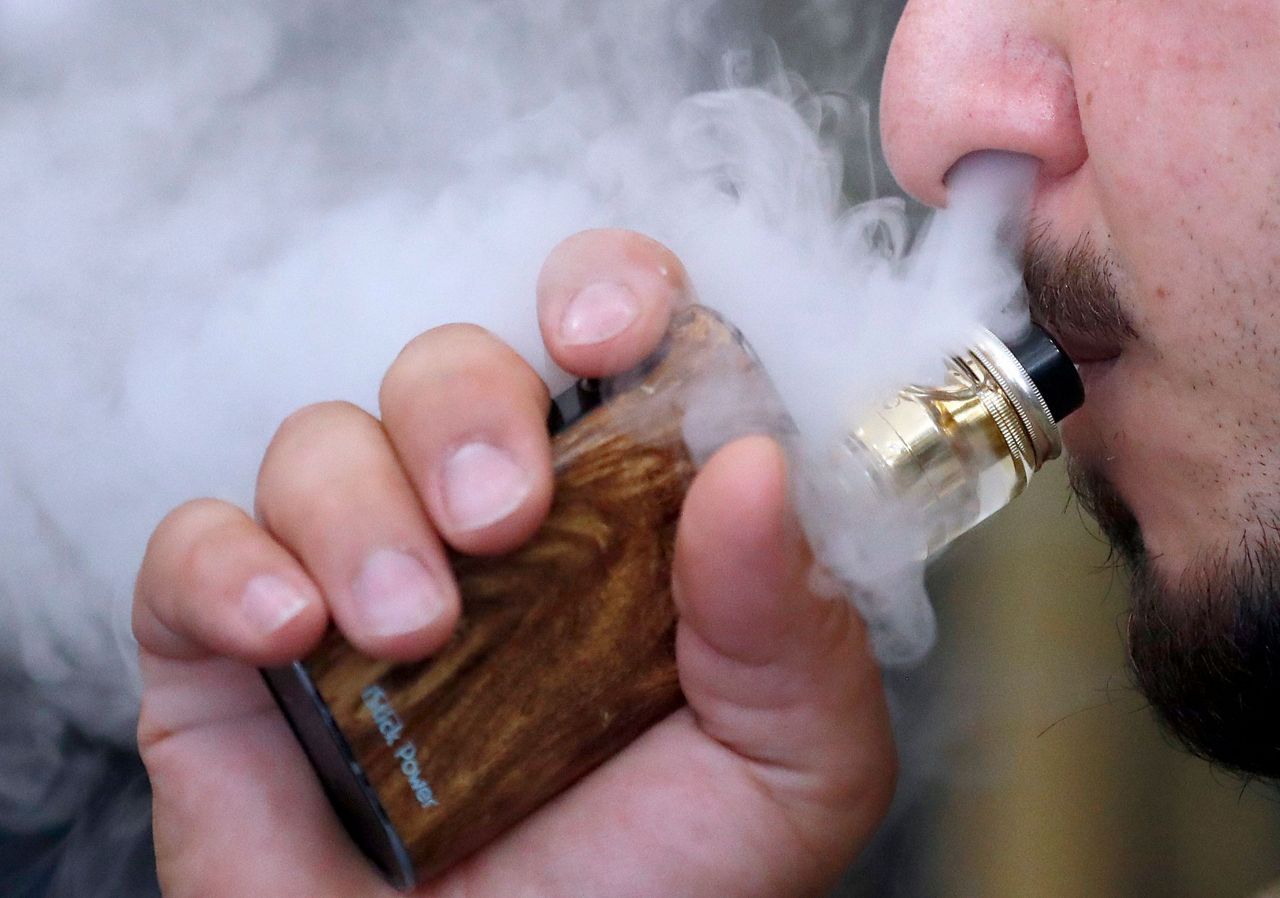LONDON (AP) — While the U.S. scrambles to crack down on vaping, Britain has embraced electronic cigarettes as a powerful tool to help smokers kick the habit.
The Royal College of Physicians explicitly tells doctors to promote e-cigarettes "as widely as possible" to people trying to quit. Public Health England's advice is that vaping carries a small fraction of the risk of smoking.
U.S. public health officials have taken a more wary approach, and have been slow to regulate e-cigarettes. That caution turned to alarm, though, with an explosion in teen vaping, prompting the federal government and some states to take steps to ban fruit and minty flavors that appeal to youths.
And now, with hundreds of U.S. cases of a mysterious lung illness among vapers, the U.S. Centers for Disease Control and Prevention is recommending that people consider not using e-cigarettes, especially those with THC, the compound that gives pot its high.
The U.S. reaction is "complete madness," said Dr. John Britton, director of the U.K. Center for Tobacco and Alcohol Studies at the University of Nottingham. "The reality with smoking is, if you tell people to stop vaping, they will go back to tobacco and tobacco kills."
Regulations about e-cigarettes vary by country, making for a patchwork of policies. More than 30 countries ban e-cigarettes outright; India halted sales this month. Many European countries including Austria, Belgium, Germany and Italy classify e-cigarettes as tobacco products, subjecting them to strict controls. They are mostly sold as consumer products in Britain and France, under more lax rules.
Since arriving in the U.S. in 2007, e-cigarettes have been largely unregulated. The U.S. Food and Drug Administration didn't get the power to do that until three years ago and is still working out the details. Black market versions, meanwhile, have flourished.
Appearing before Congress last week, the U.S. FDA's acting commissioner was pressed to explain the agency's position. Several lawmakers suggested e-cigarettes should be completely removed from the market.
"We do not consider these products safe, we think they have harm," said Dr. Ned Sharpless. "We do not think really anyone should be using them other than people using them in place of combustible tobacco."
In Britain, a review by Public Health England, an agency similar to the CDC, concluded that vaping is about 95% less dangerous than smoking. A leading British anti-tobacco charity, Ash, even called for e-cigarettes to be licensed as medicines and provided free to smokers trying to quit by Britain's government-funded health system.
"We need radical solutions to stop smoking and one option is providing smokers with e-cigarettes so they can get the nicotine they need without the tobacco smoke," said Britton. "We have a much more relaxed attitude to people being addicted to nicotine on the basis that nicotine itself isn't particularly hazardous."
E-cigarettes and other vaping devices typically heat a solution containing nicotine into a vapor that's inhaled. The amount of nicotine varies widely: Some countries set limits on the amount. There's no cap in the U.S. And the surge in U.S. teen vaping brought warnings from health officials that nicotine can harm a teenager's still developing brain.
"What's right for England might not be right for the U.S.," said Ryan Kennedy of the Institute for Global Tobacco Control at Johns Hopkins Bloomberg School of Public Health.
Compared to the United States, England has had historically higher rates of tobacco use and a "deeper comfort" with the idea of substituting a less harmful habit for a dangerous one, Kennedy said. British health officials have been able and willing to strictly regulate e-cigarettes while promoting them as a stop-smoking tool.
"It's not very surprising that a place like England has embraced e-cigarettes," Kennedy said. "A lot of things lined up to make sense to use these devices to help people transition away from cigarettes."
In the U.S., meanwhile, the rapid rise in e-cigarettes' popularity among teenagers, a thriving black market for vapes containing marijuana extracts and the illness outbreak have muddied the public health message recently, Kennedy said.
"Obviously there are a lot of moving parts with this," he said.
Another key difference is advertising. Unlike in the U.S., Britain has tight regulations on advertising vaping; all TV, online and radio marketing is banned, explained Linda Bauld, a public health professor at the University of Edinburgh.
"E-cigarettes are promoted to middle-aged smokers as a way to quit and the imaging from our annual quit campaign is usually all men with beards, so it looks pretty boring," she said.
On Friday, the CDC said it appears THC vaping products are playing a role in the puzzling U.S. outbreak of lung injuries and deaths. The agency said many of the 800 people who got sick reported vaping THC. It said more information was needed on whether a single product, substance or brand is responsible. Some researchers suspect an ingredient used as a thickener in vaping oils, particularly in black market products.
"It's inconceivable that any legitimate vaping product would cause that degree of damage," Britton said.
Some British e-cigarette users said, in the meantime, their own habits wouldn't change.
"There seems to be a bit of a panic over there, but that has nothing to do with us," said Lewis Niall, a personal trainer outside a north London vaping store.
Niall said vaping as a whole shouldn't be tarnished if the problem is illicit marijuana products.
"For me, I feel so much better since switching from cigarettes that I don't think anything will change my mind," he said.
____
AP Medical Writers Mike Stobbe in New York, Carla K. Johnson in Seattle and Matthew Perrone in Washington contributed to this report.
___
The Associated Press Health and Science Department receives support from the Howard Hughes Medical Institute's Department of Science Education. The AP is solely responsible for all content.
Copyright 2019 The Associated Press. All rights reserved. This material may not be published, broadcast, rewritten or redistributed.



